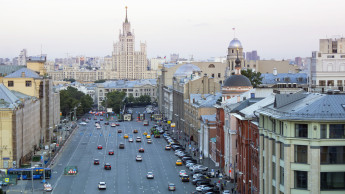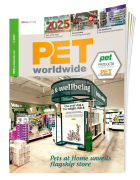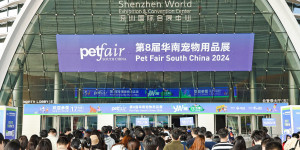The EU celebrated its greatest enlargement so far with 10 new members joining on 1 May 2004. The new member states are mainly Eastern European countries. The EU enlargement also opens exciting new doors for the pet product industry in the East and West alike
The majority of new member states still have much lower standards for pet keeping than the rest of the EU countries.
The pet product industry
Products from Eastern European countries are a common sight in Western European markets just as Western European products are in Eastern European markets. At first the Eastern European countries only offered services, for example for the manufacture of aquarium furniture, the production of glass tanks, filling/decanting and clothing manufacture but many companies in Poland, the Czech Republic and Hungary too have become serious players in the markets in Western Europe over the past few years. Most of these are well established companies which developed very slowly up to 1990 and were limited to customer bases in the East. The fall of the Berlin Wall and the opening of the borders made entry into Western markets possible. Many small importers and some individual retailers too immediately jumped at the Eastern European neighbours because they hoped to make a quick profit in the West with their products, which could still be bought relatively cheaply. But today only the companies that have firmly established themselves by offering straightforward business transactions and reputable sales practices still remain. In particular, numerous small importers were forced to capitulate when confronted with expensive and elaborate import formalities and the corresponding large quantities they had to order.
By joining the EU and enjoying the new and faster cross-border traffic and thus easier cross-border trade, it is now once again possible and profitable for even relatively small speciality retailers in Germany, Holland and Austria, for example, to import from companies in Poland, the Czech Republic or Hungary. They can even import the small quantities that were no longer profitable before joining the EU because of the high administrative expenses involved. Many small and young companies from the new EU countries were clamouring for and received the attention of visitors to the Interzoo trade fair. In only a few cases did they win concrete contracts, but the positive impression is a lasting one: “My impressions were generally positive and I feel closer to our potential partners. I know there will be no legal barriers to doing business”, says Karolina Capova of the Czech food manufacturer Vafo Praha.
Tropical in Poland wants to expand its market and to increase its market share.
Future prospects
For manufacturing companies in the newly joined states, accession to the EU means a tremendous change towards easier exports: ”Sure, we have less paperwork when it comes to our clients' needs,“ says Emilia Hahn, export manager of Tropical in Poland. “Deliveries to and from EU countries are quicker and easier. And cheaper too because there is now no customs clearance and no duties have to be paid.” But on the other hand it entails a number of new tasks and requirements, Emilia Hahn continues: “We have more paperwork, there are different declarations, records etc. now which have to be presented to the authorities. It is about VAT payments and Intrastat. We didn't have to fill in these forms before in our export department so we have to learn new things.” But this major simplification of cross-border traffic could pose a certain danger for companies in the new member states, because it is also much easier for Western European countries to export their products and services to Poland, the Czech Republic, Cyprus and Malta.
Many things will also be easier for importing wholesale companies in the new EU member states. And Western European manufacturers are aware of that too and have put out their own feelers for contacts and reputable companies at Interzoo. Diana H. Sziklai, managing director of Gimborn in Hungary, comments as follows: “We and other companies were approached by several foreign companies, all looking for a local company to distribute their products. This is currently the easier way for them to reach the Hungarian market, a market they may not be completely familiar with, so they want to sell their products through existing companies.”
The retail trade
The traditional retail store, which in Eastern European countries usually occupied a very small sales area of maximum 100 m², is now exposed to the greater involvement of Western European speciality stores and DIY or garden centre chains. In the worst case it must be assumed that these retailers with their small structures cannot compete with the appearance of a large chain backed by Western European investors. Their big advantage is of course their knowledge of the home market, which new investors need rather badly. But development is in full swing. The German DIY company Praktiker, for example, is very active in Hungary. Praktiker has already opened subsidiaries in Romania and is now planning its first store in Bulgaria. And Hornbach, another DIY chain, has opened four stores in the Czech Republic, while others are at the planning stage. The French company Mr. Bricolage has taken a pioneering role in the involvement of DIY companies in these two countries, which from 2007 will be part of the EU. Mr Bricolage has opened three large stores in Bulgaria, each of them with a pet department.
German franchise company Fressnapf is assuming the lead role where the involvement of Western European retail companies in the pet product sector is concerned. On 21 May Fressnapf opened its fourth store in Budapest, Hungary and the opening of another store is scheduled for late summer. “In view of the logistics alone”, says Carmine Gallo of Fressnapf, “Hungary’s entry into the EU is a great relief for us.” But Fressnapf does not have any concrete plans for the other new member states, even if it regards Poland as “very interesting”. In Slovakia, however, they are taking the bull by the horns. The wholesale company Placzek is planning to open several speciality pet retail stores within a franchise system. And there have been rumours about another franchise model for the speciality pet retail sector in Slovakia, too.
Bully Pet in the city centre of Bratislava, Slovakia, is a typical example of the Eastern European pet product retail sector.
The animals
It is expected that the trade in rare and/or protected animals and plants will pose especially great problems. In most of the new member states, there were much lower standards for the protection of species than in the EU. And the protection of animals is not such a characteristically noble notion amongst the Eastern European population as in Germany, for example. Back in April, the WWF in conjunction with TRAFFIC (Trade Records Analysis of Flora and Fauna in Commerce) Europe published a report entitled “Erweiterte Außengrenzen: Neue Herausforderungen für die Kontrolle des Handels mit gefährdeten Arten in der EU“, “Enlarged external borders: new challenges for controlling the trade in endangered species in the EU”, (www.wwf.at/Channels/artenschutz/experte/article908/). Both organisations fear that with the EU enlargement more endangered animal and plant species from existing EU countries will again come onto the market. Tortoises, parrots, snakes and lizards are some of the names on the list of endangered animal and plant species. The report continues by saying that the candidates for accession to the EU are playing a major role in the international trade in wild species and are also transit countries for imports into the European market from Asia, Africa and South America. Between 2000 and 2002, more than a thousand endangered “Kleinmann“ tortoises were allegedly smuggled into Poland and Malta. The report called the countries that were candidates for accession to the EU world champions in the import and export of rare animals and plants. “In 1999, for example, the Czech Republic was top of the list for trading in the most endangered parrot species. “ The report continues: “If nothing is done to stop the smuggling the EU would run the risk of becoming a centre for the illegal import and export of wild animals, plants and their products.”
The fourth Fressnapf outlet was opened on 21 May in Budapest, Hungary.
Future prospects
It is very difficult to offer a reliable forecast of future development after such a short period of time, just a few weeks after the 1st of May. But one thing is certain. Completely new prospects and possibilities will open up for existing as well as new member states with regard to the exchange of goods and services. Well done to anyone who started to make contacts and entered into partnerships several years ago. Most companies in the new member states are well prepared for whatever is coming from “the old Europe”. ”I believe that becoming a member of the EU is a significant milestone”, continues Diana H. Sziklai of Gimborn in Hungary. “Of course, this is a big challenge for the countries and their people but I hope that the people will overcome all the obstacles just as they have done many times in the past.”
The next new EU members will probably be Bulgaria and Romania. Negotiations for their accession in 2007 are going full speed ahead, and in these countries too the pet product industry is experiencing strong growth. And belonging to the EU will give new momentum to this development, just as existing EU members are expecting many a new impetus from these two countries.
Petfood in the new EU countries (value; in mio. €)(download pdf-file)
Breakdown of the main categories in petfood for dogs and cats (in per cent)(download pdf-file)
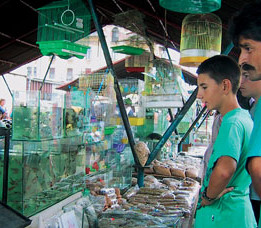


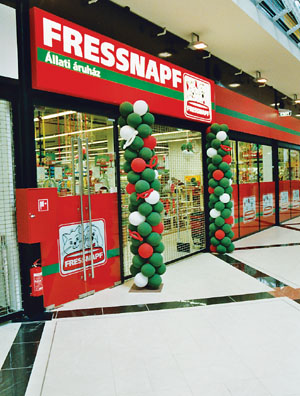

 Menü
Menü

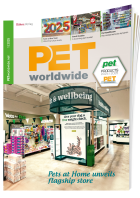



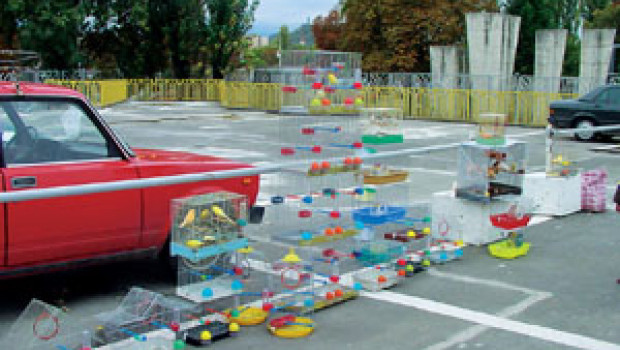
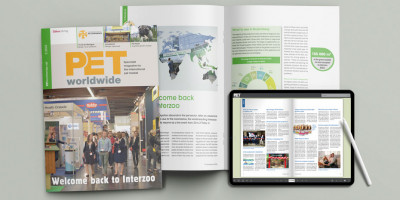
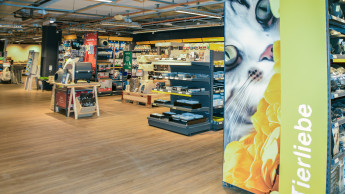



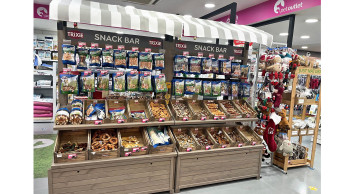
 Print - digital - online
Print - digital - online

